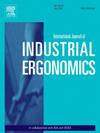轻度缺氧对飞行员表现和生理反应的影响:系统回顾和实验研究
IF 3
2区 工程技术
Q2 ENGINEERING, INDUSTRIAL
International Journal of Industrial Ergonomics
Pub Date : 2024-09-24
DOI:10.1016/j.ergon.2024.103650
引用次数: 0
摘要
航空中的轻度缺氧是一种众所周知的影响飞行安全的现象,特别是在通用航空中。有关轻度缺氧对飞行表现和生理反应影响的实验研究十分有限,结果往往相互矛盾。本研究旨在加深理解轻度缺氧对飞行员生理反应和飞行表现的影响。研究人员对现有知识进行了系统综述,并评估了以往研究结果的一致性和可推广性。然后,通过一项实验获得了新的经验数据,该实验旨在关注轻度缺氧条件下的心脏活动和表现。12 名男性现役飞行员参加了实验,实验包括两次受控条件下的模拟飞行。以往的研究在方法和结果上存在很大差异,与此不同的是,本研究采用了一种方法来隔离轻度缺氧的影响,同时通过使用全飞行模拟器和减氧呼吸装置来接近真实的飞行条件。实验并未显示出明显的性能下降,同时观察到心脏活动的代偿机制,具体表现为心率和心率变异性的增加。这些研究结果为现有知识体系提供了更加一致的方法框架,并强调了对轻度缺氧的生理适应,为进一步研究轻度缺氧、飞行员表现和生理反应之间的关系奠定了基础。本文章由计算机程序翻译,如有差异,请以英文原文为准。
Impact of mild hypoxia on pilots’ performance and physiological response: A systematic review and experimental study
Mild hypoxia in aviation is a well-known phenomenon that affects flight safety, particularly in general aviation. Experimental research on its influence on performance and physiological response has been limited, often yielding contradictory results. This study aimed to deepen the understanding of mild hypoxia's effects on pilots' physiological responses and performance. A systematic review was conducted to synthesize existing knowledge and assess the consistency and generalizability of previous findings. Novel empirical data were then obtained through an experiment designed to focus on cardiac activity and performance under mild hypoxic conditions. Twelve male active military pilots participated in the experiment, which involved two simulated flights under controlled conditions. Unlike previous studies, which have varied significantly in methodology and outcomes, this study employed an approach to isolate the effects of mild hypoxia while simultaneously approximating real flight conditions by using a full flight simulator and a reduced oxygen breathing device. The experiment did not indicate significant performance degradation, while compensatory mechanisms in cardiac activity were observed, specifically in the form of increased heart rate and heart rate variability. These findings contribute to the existing body of knowledge by providing a more consistent methodological framework and highlighting the physiological adaptations to mild hypoxia, serving as a foundation for further investigation into the relationship between mild hypoxia, pilot performance, and physiological response.
求助全文
通过发布文献求助,成功后即可免费获取论文全文。
去求助
来源期刊
CiteScore
6.40
自引率
12.90%
发文量
110
审稿时长
56 days
期刊介绍:
The journal publishes original contributions that add to our understanding of the role of humans in today systems and the interactions thereof with various system components. The journal typically covers the following areas: industrial and occupational ergonomics, design of systems, tools and equipment, human performance measurement and modeling, human productivity, humans in technologically complex systems, and safety. The focus of the articles includes basic theoretical advances, applications, case studies, new methodologies and procedures; and empirical studies.

 求助内容:
求助内容: 应助结果提醒方式:
应助结果提醒方式:


